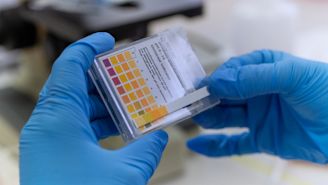Did you know that every time you pee, your urine gives important clues about your overall health? "The healthiest urine color is clear,” says Jamison Jaffe, DO, a urologist with St. Mary Medical Center in Langhorne, Pennsylvania, “It’s a sign of good hydration.” But if your urine is any shade other than clear or light yellow, it could indicate trouble. Here's a guide to urine color and what your pee may be trying to tell you.
Why is my pee cloudy?
You may have an infection. Bacteria from a urinary tract infection (UTI) can cause a cloudy appearance, not to mention a painful burning sensation when you pee. If you think you may have a UTI, see your doctor, urges Jaffe. A UTI "typically won't go away on its own," he warns. And while over-the-counter treatments may help the symptoms, they don't treat the infection. "Anyone with a urinary tract infection should consult a physician," Jaffe says.
Why is my pee orange or muddy brown?
You need to start drinking more water. When you’re dehydrated, your kidneys hold on to as much water as possible, which means the urine will be darker in color and more concentrated, says Dr. Jaffe. The urine may have a stronger odor, too. Liver disease or a UTI can cause a similar change in color, so talk with your doctor if the problem doesn't clear up.
Why is my pee green or blue?
Think back to what you ate. The weird color may be a result of certain dyes in your food. If dinner's not to blame, check your meds, says Jaffe. “The color of the pill can actually excrete into the urine,” he explains. If your urine is blue or green, read the warning labels on your prescription bottles to see if a change in urine color is a known side effect. If not, give your doctor a call.
Why is my pee pink or reddish?
Make a doctor’s appointment now. “Red urine is the most concerning,” says Jaffe. While a pinkish hue can sometimes be explained by strenuous exercise, a side effect from medication, a UTI, kidney stones—or even a healthy helping of beets for dinner—it may mean something more serious. “Really, any degree of blood in the urine has to be looked into,” says Jaffe. “The most significant thing red urine can indicate is a urologic cancer.”






